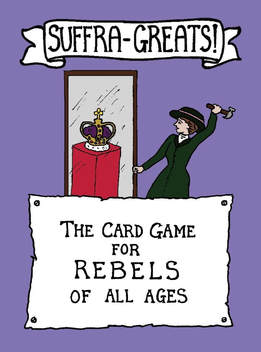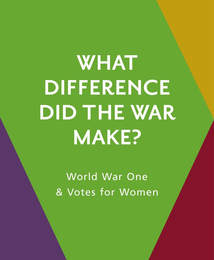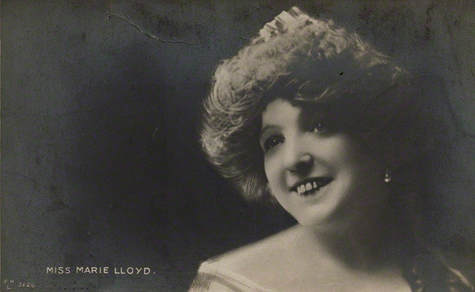|
Another curio from the Lord Chamberlain's Plays Collection - a sketch performed at the Lewisham Hippodrome in April 1913 and set at an unnamed London Underground station, in which the Devil (later revealed to be a medical student in costume as Mephistopheles) and his wife (later revealed to be a nurse in costume as a Folly) are waiting for either a tube train or an airship to take them home. About halfway through the piece the Devil brags to a Policeman that he is inciting militant suffragettes to commit violent crimes. As he is getting arrested a suffragette runs in, puts something into a handily adjacent post box that sets it on fire, shouts "Votes for Women" and runs off, pursued by the Policeman. There's a reference to the Devil's wife being a hunger-striker too. Curious!
1 Comment
Reading Sixteen - 17th December 2020
'Our Own Twelve Anti-Suffragist Reasons', 'Why We Oppose Pockets for Women', and 'Fashion notes: Past and Present' from Are Women People? by Alice Duer Miller (1915) Prologue for a Women's Theatre by Israel Zangwill (1911) Women Do Not Want It by Charlotte Perkins Gilman (1897) 'Cautionary Tales in Verse' from Votes for Women, 6 October 1911 Readers: Maggie Saunders, Sajeela Kershi, John Fleming, Catherine Harvey Green, Annie Walker, Philippa Ritchie, Sarah McCourt, Jamie Newall, Sarah Annakin, Lucy Stevens, Jemma Churchill, Stephanie Fayerman. Reading Seventeen - 26th January 2021 10 Clowning Street by Joan S. Dugdale (1913) Little Jane and Grandmama and Fair Play by Lorimer Royston (1914) Readers: Jemma Churchill, Bronwyn Elizabeth, John Fleming, Luke Meredith, Genevieve Swallow, Catherine Harvey Green, Lucy Stevens, Maggie Saunders, Annie Walker, Jamie Newall, Sarah Annakin, Philippa Ritchie, Sarah McCourt. Reading Six - 8th September 2020 Her Will by Christopher St John (1914) At the Gates by Alice Chapin (1909) Readers: Caroline Cooke, Stephanie Fayerman, Emma Fenney, Sarah Ford, Lucy Frederick, Kathryn Martin, Charlotte Moore, Jamie Newall, Bob Sinfield, Alison Skilbeck, Lucy Stevens, Genevieve Swallow Reading Four - 18th August 2020 The Reforming of Augustus by Irene Rutherford McLeod (1910) In the Workhouse by Margaret Wynne Nevinson (1911) Readers: Jemma Churchill, Caroline Cooke, Maroussia Frank, Lucy Frederick, Sajeela Kershi, Kathryn Martin, Maggie Saunders, Genevieve Swallow, Annie Walker, Sarah-Louise Young In the first few months of 2012 I worked as a dresser on South Downs/The Browning Version at the Comedy Theatre in London. I was in the second year of my PhD, and also putting together the manuscript of The Methuen Drama Book of Suffrage Plays. Working in wardrobe on West End shows is intense - you're in eight shows a week and often also more for laundry calls, understudy runs, and maintenance sessions. It's also great fun - I've worked in wardrobe on nearly 30 West End shows since 1998 and been fortunate to work with and for some incredibly lovely and talented people on stage and off.
It was on that show that the idea of a suffrage themed 'top trumps' style game first came to me. I thought it would be a great way to introduce some of the amazing campaigners I was finding in my research - and talking about constantly! - to new audiences in an accessible and fun way. My friend Greg who was then the deputy head of the wardrobe dept and is now a tailor was super encouraging of the idea and I mocked up a set to see if it would work. It did. Since that day I've been going on and on about this idea, keen to make it happen but not knowing how to do so. But finally - in 2018 it has! It was totally worth the wait. Suffra-Greats! is a reality. My second edited collection with Methuen Drama is being published on the 2nd July! It contains twelve pieces in all - a wide variety of material written by female and male suffragist writers between 1908-1914.
Spanning different styles and genres, the pieces explore many issues that interested feminist and suffragist campaigners such as the value of women's work, domestic and economic inequality, visibility in public space, direct action and its consequences, sexual double standards, and the influence of the media on public opinion. This collection builds on my first volume of plays, published in 2013. If you get both you will have an impressive collection of playable, accessible and fascinating plays that speak to us directly about how the suffrage movement represented itself on the stage and through the medium of performance. Here's a little bit about each of the plays to whet your appetites! It's been a couple of months now since my job at Parliament finished - and I've been meaning to write about some of the creative outputs of my time as part of the Vote 100 team. I was part of an AHRC funded project called 'What Difference Did the War Make? World War One and Votes for Women' run by the University of Lincoln and UK Parliament Vote 100 alongside the University of Plymouth. The project outputs included three panel events in Lincoln, Plymouth and London discussing not only the project topic but the work and legacy of past and present female Members of Parliament, alongside workshops for young people, and an exhibition in Parliament and online. You can see that exhibition here: www.parliament.uk
I'm not going to talk about those outputs in this blog post though. Instead this is a brief introduction to some of the other outputs involving project research that happened over the course of my year there - outputs I'm really excited about and that reached out to different audiences in different spaces. There's music, games, theatre, and sweets! My Time Traveller piece broadcast on BBC Radio 3's Essential Classics on Thursday 8th February 2018, was entitled 'Suffragettes on the Run' - and you can listen to it here (it's 1hr and 12 minutes into the programme) Music Hall star and Actresses' Franchise League member Marie Lloyd, no stranger to campaigning for the rights of performers within the theatrical profession, lent her support to suffrage societies by singing at the WFL’s Old World Fair at Caxton Hall in 1909 as part of a series of concerts to raise funds, and appearing in How The Vote Was Won in the same year, presumably as the character of Maudie Spark, the music hall comedienne. As an influential, wealthy and famous performer, she was able to support the sisterhood of suffragists in unique ways. One such gesture involved her allowing her theatrical hamper to be used to smuggle a militant speaker into a meeting at the London Pavilion in 1913. Marked ‘Marie Lloyd, Pavilion. Luggage in advance,’ the hamper contained the WSPU speaker Annie Kenney, who was out of prison on licence after a period of hunger-striking and subject to immediate re-arrest under the ‘Cat and Mouse’ Act if she appeared in public. Kenney wrote about the incident in her autobiography, Memories of a Militant, recalling the workmen who unknowingly delivered her to the theatre in the hamper making ‘growls…about the weight, about actresses having no consideration for the poor men who had to carry their baggage, and so on. I was turned, toppled, banged, dropped, before one of them got me (in my hamper, of course) on to his back.’ The ruse worked, and despite the police officers stationed around the entrances to the theatre, Kenney made it inside unnoticed. The London Pavilion was a regular site for WSPU meetings in 1913, and the building that housed the theatre is still a prominent part of Piccadilly Circus. I remember it housing waxworks music show 'Rock Circus' when I was a child and it most recently was the site of Ripley's Believe it or Not. Built in 1885, it functioned as a music hall and variety venue until 1912, when it became the home of a string of musicals. as well as mixed bills. You can see a London Pavilion programme from 1913 here - and on the bill is a performance by Graham Moffat's company of Scottish Players. Moffat was a suffragist and the author of suffrage play 'The Maid and the Magistrate', published by the AFL. His wife, actress Maggie Moffat, was the second Scottish suffragist to be imprisoned for campaigning, when she was arrested in 1907. The Glasgow WSPU delegate for the Women's Parliament in Caxton Hall, Maggie Moffat was one of fifty-three women arrested when mounted police broke up a group of women marching peacefully to the House of Commons with a resolution for the Prime Minister. She was subsequently imprisoned in the second division in Holloway.
But back to the story in question! I wrote a blog post about suffrage plays for the Vote 100 project - you can read it here. Whilst doing it, I began to compile a list of all the professional performances of suffrage plays, old and new, since 2008... and I'd like you to check yours or one you attended or one that you are putting on next year is on the list, and if not, comment on this post so I can add it to the list!
I am including:
At the moment I am not including projects or performances that have only taken place in formal education institutions, so schools, colleges and universities... unless those performances were/are open to the public or are made available to the public online through video, audio or other online dissemination. Please don't be cross if yours is not there - comment and I will add it to the list. This first list is purely made up of projects and performances I remember being in, putting on, attending or knowing about so is limited by those factors. Please comment and let's make it a much better and more inclusive and more extensive list! |
NaomiThoughts, reflections, bits of research Archives
April 2023
Categories
All
|



 RSS Feed
RSS Feed